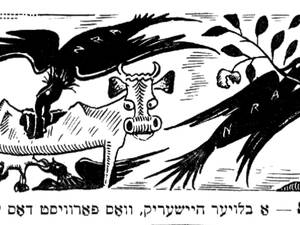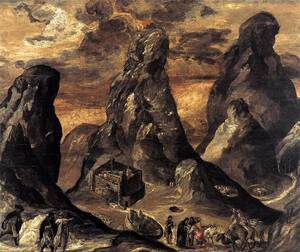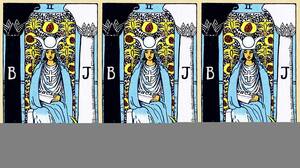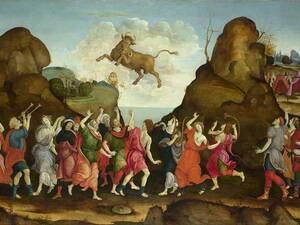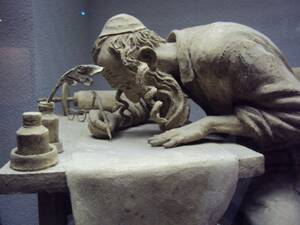Exodus: Mishpatim
Terrible violence will unfold while the Israelites are kept busy with lines and lines of civic code.
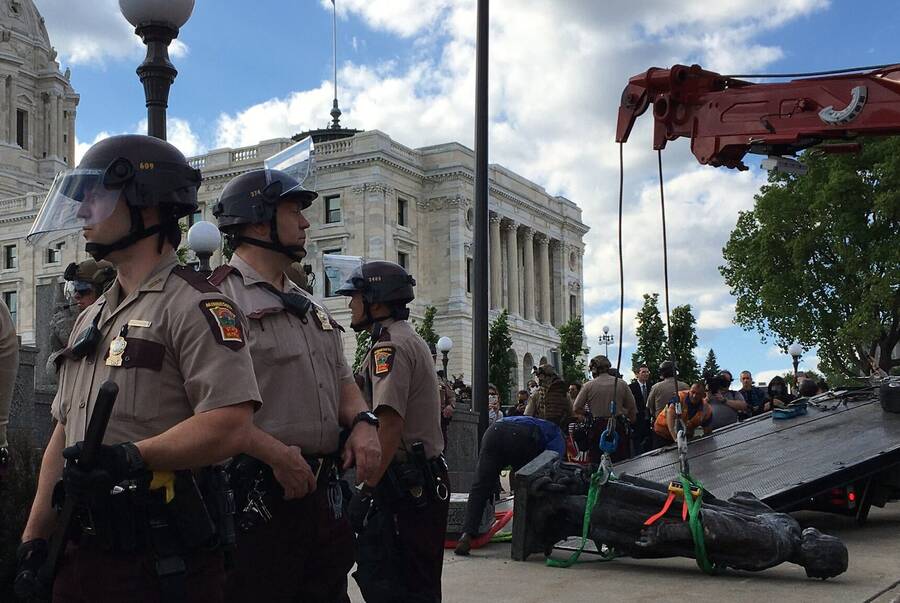
Read previous entries of Slow Burn: Quarantine Edition here.
Mishpatim
Exodus 21 – 24
Brooklyn, NY
Dear fellow subjects of the law,
As I confessed in the introduction to this series, I don’t know anything about the Bible. I accepted the assignment of writing about this parsha without checking in advance to see what it contained. As my turn approached and I fell behind on the group’s reading schedule, I grew increasingly anxious about whether or not I’d have anything intelligent to say. I comforted myself with the idea that, if worse came to worst, I could fall back on my training in narrative theory; after all, Exodus had been full of tension and drama so far. Texting with a seminarian friend, though, made me nervous again. He asked what section I was writing on. “Mishpatim,” I responded. There was a brief pause. “Ah,” he typed, “a little less narrative sizzle.”
This cautious verdict put it mildly. Mishpatim, which translates simply as “laws” and is often referred to as the Book of the Covenant, is exactly what it sounds like: three chapters of extremely detailed rules, plus a brusque fourth section that’s basically an elaborate and surprisingly gory contract signing (to mark the occasion, Israelite leaders sacrifice some bulls and dump blood, Carrie-style, upon the people). It is an unannounced intermission smack dab in the middle of one of the most dramatic and impressively cinematic scenes in Exodus. At the end of the previous parsha, Moses ascends to Mount Sinai to receive the Ten Commandments; lightning crashes, clouds descend, and bombastic music swells. When Mishpatim begins, however, God’s elaborate special effects grind to a halt. The wind machines shut off, the actors break character, and the director reads his copious notes aloud to everyone on set. The parsha is a verbose and uncoordinated lunge toward clarity: In its haste to explain what the commandments actually command, it only introduces more confusion.
In fiction, a break in the forward movement of a story often gives readers some sense of deeper background; it could be a chapter of rich description or expository flashback, in which we might learn more about a particular item or place, or a character’s inner life. A pause in a narrative can fill in the otherwise unobserved details of its world. Along with Exodus, I have spent this isolation period slowly working my way through Moby-Dick for the first time, and I happened to read Mishpatim and Melville’s much-cited “Cetology” chapter within the span of a few days. The latter, too, is a surprising interlude of stillness in a story that’s just starting to build momentum, appearing after the introduction of moody Captain Ahab, but before the revelation of his dangerous obsession with the white whale. “Already we are boldly launched upon the deep,” Melville’s narrator, Ishmael, announces at the outset of “Cetology,” “but soon we shall be lost in its unshored, harborless immensities.” First, however, we must take in an unscientific, extremely delightful history and taxonomy of whales. I’d been advised by Melville-loving friends to linger on this detour, but I was still impatient when I got there; after nearly 200 pages without any sign of Moby-Dick, I had to resist the urge to skim.
My persistence paid off. “Cetology” exudes the manic joy of encyclopedism; we don’t learn much about actual whale biology, but we do absorb the infectious spirit of obsession. Through this catalogue of whale-lore, we learn about Ishmael’s consuming fascination with his quarry, and are ourselves drawn into that fascination by the charm of the prose and the mystery of the creatures he describes. In this way, “Cetology” turns out to be less an intermission than an initiation into the novel’s alien world, one that must be experienced before plunging into its depths.
Like “Cetology,” Mishpatim is unexpectedly exuberant. To my surprise, I found it just as engrossing as Melville’s whale catalogue, and far more informative; laid out with painstaking specificity, the ordinances listed in the parsha evoke the world of the fugitive Israelites in more textured detail than the plot-driven earlier chapters. Mishpatim’s “legal miscellany,” in translator Robert Alter’s terms, is marked by curious inconsistencies in scale that intensify both the parsha’s realism and its minutiae-mad absurdity. The most serious of matters, like the rights of slaves and the value of human life, are arranged haphazardly alongside guidelines on how and when to throw parties for God. Such juxtapositions appear both among the book’s hit singles (“an eye for an eye” is shuffled in with “You shall not boil a kid in its mother’s milk”) and in the lesser-known B-sides (“You shall not permit a female sorcerer to live” awkwardly accompanies “When you come upon your enemy’s ox or donkey going astray, you shall bring it back”). Yet all of these laws are pronounced with the same gravity, secondary to the Big Ten but seemingly equal amongst themselves. Together, they fill out a surprisingly detailed vision of the social and economic structures of the world described in Exodus. The epic motion picture event becomes a low-budget naturalist film, as we intuit from the specificities of the ordinances what exactly terms like “slave” or “wife” or “enemy” mean in the day-to-day dealings of this culture, and we begin to imagine what the lives of these various kinds of people might look like.
Just as “Cetology” obliquely tells Moby-Dick’s readers a great deal about its narrator, so too does Mishpatim reveal much about the figure that I’ve been reading as its indirect narrator, God. The Lord’s behavior in earlier chapters of Exodus has already shown Him to be show-offy and violently capricious, as Dan discussed in his epistle. Mishpatim’s explosion of litigious detail, on the other hand, emphasizes God’s sheer nitpickiness, filling in a sketch of an unstable and compelling character; let’s not forget that this is the same deity who, in Genesis, sends the Flood to give Himself a chance at a do-over on creation, but also gives Noah a hair-splitting how-to guide on building an ark. This God expects total devotion, but rather than getting metaphysical and explaining what that devotion really means, he gets caught up in the numbing thrill of admin.
It’s precisely this level of obsessive interest that fascinates me and makes me want to keep learning about the God revealed here, a God who is divine in His seemingly limitless power, but disconcertingly human in His bureaucratic interest in dictating petty details. The cunningly inextricable weave of faith and pragmatics in this social and religious contract creates the illusion of a simple bargain. Many of the laws simply lay the foundations for a functional agricultural society: Cover the pits you dig, keep your bloodthirsty oxen enclosed. But the covenant demands that the Israelites sign on with equal commitment to the rules of animal husbandry and an unwavering devotion to a vengeful, exacting God. More perplexingly still, only the former are clearly defined here. The civic ordinances that God requires are outlined with a maddening precision, but the other half—the utter trust in and complete surrender to God, upon which all of this hinges—is left assumed and unexplained. To question this surrender is just not an option, as Jacob explained in his letter last week. But why should anyone invest their blind faith in a God who has only demonstrated himself to be petty, forgetful, and vicious? This leads me to a very basic question about what it means to create laws and what it means to follow them: Do you have to believe in the lawmakers—jealous, capricious, cruel more often than fair—to believe in the rule of law itself?
This question forces me to look past the engrossing distractions of world-building and wonder what this forced covenant actually offers its imagined adherents. The slick administrative legerdemain that Mishpatim’s covenant performs—the deal that binds action and belief—is a showy act of misdirection on the part of a God who distracts His subjects with endless rules about how they should live, while glossing over what He will do to fulfill the terms of the contract. For, while we are reading the fine print, God is doing some very dodgy hand-waving over on His side of things. He expansively gestures toward what His people will get in exchange for believing in Him and following his rules, promising the Israelites that He will always hear their cries and keep them safe:
And you shall worship the LORD your God, and I will bless your bread and your water; and he will take away sickness from your midst. There shall be no woman miscarrying or barren in your land. The count of your days I will fill. My terror I shall send before you and I shall panic the whole people among whom you will come, and I shall make all your enemies turn tail to you.
This all seems too good to be true—and indeed, it seems obvious that these hyperbolic assurances don’t come free. The price, we learn, will be paid not by Moses and his followers, but by the other communities that already dwell in the Promised Land, the “place that [God] has made ready”—but not completely ready. The text simply leaves no room to worry about the other people the Israelites will encounter, the soon-to-be “annihilate[d]” Amorites, Hittites, Perizzites, Canaanites, Hivites, and Jebusites. This is the most jarring example of Mishpatim’s signature confusion of scale: One minute God states His preference for unleavened bread, while the next, He announces his plan to obliterate whole peoples. For a book ostensibly concerned, up until now, with oppression and injustice, this casual promise of genocide is a terrible surprise, though perhaps God’s treatment of the Egyptians should have prepared us for it.
The Israelites simply aren’t supposed to concern themselves with these unseen peoples or their glamorous gods. The implied audience for Mishpatim—unquestioning believers in the sanctity of the covenant—is expected to worry obsessively over the details of their contract with God, while blithely ignoring the consequences of that contract for anyone else. It turns out that the laws are not only a pause in the forward movement of the Israelites’ triumphal narrative, but also an elision of another story: one in which terrible violence will unfold while they are busy with lines and lines of civic code. But I, a non-believing and unchosen modern reader, cannot simply let this incomplete process of filling in the details go. I cannot help but wonder about those populations annihilated so that God’s favorites might thrive, unconcerned and uncurious. What laws did those other people follow, and why? What did their gods promise them? What did they do when those gods were demolished, and their pillars smashed? Who did they cry out to with their dying breaths, who did not hear?
It feels grotesque and opportunistic to belabor the parallels, so let me just briefly state what is patently obvious. From before the founding of this country, the price of what Len called America’s “self-proclaimed chosen people’s special contract with God” has been abundantly clear. The loss of millions of Black and Indigenous lives is the unforgivable cost that our small-minded national gods, in their various appearances from early settler colonialism to late capitalism, have attempted to wave away. The ongoing protests sparked by the murders of George Floyd, Tony McDade, and Breonna Taylor can be read as a mass attempt to break, finally, the terms of this covenant; at the moment, even many among America’s chosen peoples seem to feel that they cannot continue to ignore the contract’s implicit demands. Protesters around the country—and around the world—are smashing idols to white supremacy. The questions that the Israelites should have been asking of themselves, and of their demanding, arrogant God, are the ones Americans need to keep asking—not just this month, but into the unforeseeable future—of our government and its enforcers, and also of ourselves: Who do you protect? Who do you serve?
Yours, without answers,
Sarah
Sarah Chihaya is an assistant professor of English at Princeton University and senior editor at the Los Angeles Review of Books. She is one of four authors of The Ferrante Letters: An Experiment in Collective Criticism.



